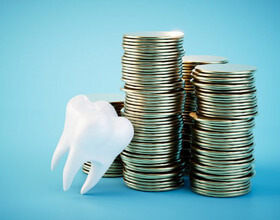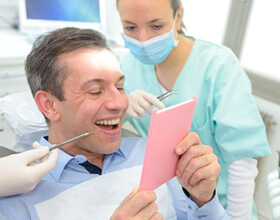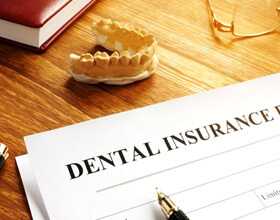Tooth Extractions – Chesterfield, MO
Removed Damaged or Injured Teeth Painlessly
At Yenzer Family Dental of Chesterfield, our number one goal is to help you keep all of your natural teeth for as long as possible. Unfortunately, whether due to decay, injury, or other factors, sometimes tooth extractions in Chesterfield, MO are necessary. However, thanks to Dr. Jeff Yenzer’s years of experience and his light touch, this potentially nerve-inducing procedure is now quick, simple, and virtually painless. If you’d like to learn more about this restorative dental treatment, then schedule a consultation with us or read on!
Why Choose Yenzer Family Dental of Chesterfield for Tooth Extractions?
- Dentist with 20+ Years of Experience
- Top-Rated Dental Team in the Area
- Multiple Financial Solutions Available
Reasons Why Tooth Extractions Are Necessary
 We mentioned in the previous paragraph that our goal is always to preserve your natural teeth. With that said, there are some cases where removing them is the best choice for the look, health, and function of your smile, including when:
We mentioned in the previous paragraph that our goal is always to preserve your natural teeth. With that said, there are some cases where removing them is the best choice for the look, health, and function of your smile, including when:
- A tooth is too damaged to be restored with a crown or filling
- Periodontal disease has deteriorated the bone supporting a tooth
- A baby tooth refuses to fall out
- Room needs to be created for a denture or orthodontic treatment
- The wisdom teeth have become impacted (stuck) or painful
The Process of Removing a Tooth
 At Yenzer Family Dental of Chesterfield, we offer two different types of extractions: simple and surgical.
At Yenzer Family Dental of Chesterfield, we offer two different types of extractions: simple and surgical.
A simple extraction is the method we use for teeth that have already erupted. After thoroughly numbing your mouth, Dr. Yenzer will hold the tooth with a pair of dental forceps, and then he’ll gently rock the tooth back and forth until it slips out on its own. We never “pull” teeth here! Often a patient is completely unaware when their tooth actually comes out!
For a surgical extraction, you’ll be put under a lighter form of general anesthesia so you’ll basically sleep through the entire procedure. Dr. Yenzer will make a small incision in the gums, remove any bone that is covering the tooth, and then extract the tooth. You’ll be woken up when he’s finished, and then you’ll need about a week to recover before you can return to your normal activities. Thanks to the pain medication he’ll prescribe you, your recovery should fly by smoothly.
Tooth Extraction Aftercare
 To ensure the healing process is as comfortable and pain-free as possible, our Chesterfield dental team will provide you with aftercare instructions, including:
To ensure the healing process is as comfortable and pain-free as possible, our Chesterfield dental team will provide you with aftercare instructions, including:
- Taking your pain medication as directed
- Avoiding exercise and other physical activities
- Not using a straw, spitting, or smoking
- Sticking to soft foods, like plain yogurt
- Keeping your mouth clean
- Drinking plenty of water
Understanding the Cost of Tooth Extractions

Tooth extractions are always reserved as a last resort. Still, if Dr. Yenzer has recommended this procedure, then it’s likely the most viable option for protecting the rest of your pearly whites. Before moving forward with your treatment, however, our team will walk you through the process and provide an accurate price estimate during your initial consultation so that there aren’t any surprises. Until then, here’s what to consider about the cost of tooth extractions.
Factors That Can Affect Tooth Extraction Cost

Dr. Yenzer will thoroughly evaluate your mouth to determine exactly how to perform the tooth extraction as well as the cost of the procedure. Some of the primary factors that can impact the price of your treatment include:
- The location of the tooth: The kind of tooth and where it’s located in your mouth can affect how much you’ll pay to have it removed.
- The quantity: The more teeth you need extracted, the higher the overall price of your procedure.
- The difficulty of the process: Certain circumstances can be more challenging to work with than others, such as an impacted tooth, which can raise the total cost of care.
Does Dental Insurance Cover Tooth Extractions?

Tooth extractions are usually considered essential procedures for preserving a patient’s oral health. For this reason, most dental insurance companies will offer coverage for some of the overall cost of the procedure once you’ve met the deductible. Of course, there might be some restrictions like a certain number of teeth or a waiting period before your benefits can come into play. Consult your provider to verify the details of your plan so you can maximize your perks. You can also speak with our team if you need help navigating your policy.
How to Make Tooth Extractions Affordable

Dental insurance is a great tool for helping patients minimize their out-of-pocket expenses. However, if you are currently uninsured, then you’ll want to explore alternative solutions for making your treatment work within your budget. Our team has a Smile Advantage dental savings plan that can give significant patient discounts on various procedures, including tooth extractions. We are also partnered with a third-party financier known as CareCredit, which can turn the sum of your treatment cost into monthly, low-to-zero interest payments. This means you’ll be able to focus more on undergoing your procedure and preserving the rest of your smile instead of worrying about breaking the bank.
Tooth Extraction FAQs
Does Getting a Tooth Extracted Hurt?
Many patients are hesitant to commit to dental treatment because they are afraid that the procedure will be painful. The good news is that whether you are having one tooth pulled or multiple, the first step is always to numb your mouth with a local anesthetic. While you won’t feel any pain during the procedure, you may experience some soreness and discomfort afterwards. By following your aftercare instructions, you can prevent infection, reduce inflammation, and promote quick healing. If discomfort worsens or you start to show signs of an infection (like a fever), give us a call so we can help!
Can I Leave the Space Empty After a Tooth Extraction?
If the tooth that is being pulled is in the back of the mouth, many patients think that they don’t need to have it replaced since no one can see it. The truth is that your teeth do so much more than just add to your appearance. They are essential for proper chewing and speaking. Even one missing tooth in the back of the mouth can make it difficult to chew, leading to poor nutrition and indigestion. It is recommended that you schedule an appointment to discuss tooth replacement options once your mouth has healed.
Can I Smoke After Getting a Tooth Extracted?
Since tobacco products can delay healing, you should not smoke immediately following a tooth extraction. It is recommended that you abstain for at least 5 days afterwards. However, if you can, it would be best to avoid smoking for at least two weeks. If you have had difficulty quitting in the past, don’t hesitate to let your dentist know. This way, they can help you to prepare in advance.
How Long After a Tooth Extraction Can I Get Dentures?
It usually takes around six to eight weeks to get dentures. Once you’ve completely healed, your dentist will take impressions of your mouth that will be used to craft your restoration. During this time, they will make a note of the ideal size, shape, and shade of your replacement teeth. Once created, your dentist will have you try them on, make final adjustments, and teach you how to care for them properly.

